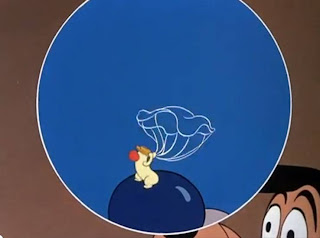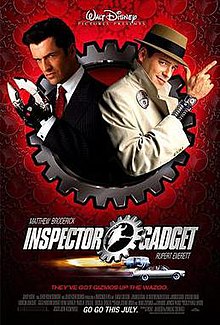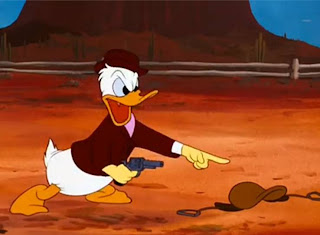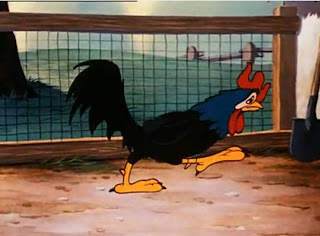This classic from 1944 stars Donald Duck, José Carioca, and Panchito Pistoles on a trip through Brazil and Mexico. The Three Caballeros is a sequel of sorts to Saludos Amigos from 1942 (you can see my blog post on that previous to this one). This contains a couple of shorts, followed by some adventures which take place among the three birds.
It begins on Donald’s birthday. He has three presents in a box, the first of which is a video projector and screen. There is a delightful moment where he gets wrapped up in the screen itself, and you hear the original Donald Duck grunts of frustration, which tend to bring a smile to the viewer. There is a two part film on this video (known as shorts for the viewing audience). The first brings us to a habitat of penguins, which focuses on one in particular who wants to move to a warmer climate. His attempts bring a chuckle or two, and the end result is comical as well. The second part is a tad strange. We meet a young gaucho who comes in contact with a donkey…and a bird. But strangely enough, these two are not separate entities. No, not in this case; they are a mix. In addition to this, he has the personality of a dog, which makes this whole thing even weirder when you look at it from that perspective. Don’t get me wrong, some of the moments between the gaucho and donkey-bird are heart-warming and sweet. However, this is definitely not my favorite part of this film.
It is now time for Donald to open his second present. Much to his happiness, it is José Carioca from Brazil! He is more than happy to see an old friend. Oh, and I’m not sure what his name is, but there is a hilarious pink bird who runs around like a fool, singing this repetitious tune. At first, I thought he was kind of annoying but after giving him a second chance, he started to crack me up! I especially loved the scene where he confiscates José’s cigar and is running around with it, singing. From this moment, the film shows its true charm. They sing a song dedicated to Baia, where you can see the animators utilized beautiful colors to demonstrate the brilliance of the area. It was quite similar to the Watercolor of Brasil scene in Saludos Amigos. Shortly after, animation meets live action as Aurora Miranda/”The Brazilian Girl” enters the picture. Everyone sings and dances, having a jolly time. This scene is impressive as it presents sheer creative talent through the use of mixing both hand drawn animation and reality. You can see at times how the animation seems a bit rougher with additional imperfections once they mesh it with live action, if that makes sense. But it is still absolute talent and genius involved in every aspect of the production.
The last present Donald receives is Panchito Pistoles from Mexico! This is where the Donald piñata montage occurs, as familiar music plays in the background. If any of you have been to the Mexico pavilion of the World Showcase in Epcot Center located in Walt Disney World, you may have heard these tunes in the Gran Fiesta Tour starring none other than The Three Caballeros (it is a boat which travels through Mexico, as José & Panchito try to find Donald). This brought back wonderful memories for me hearing the songs, and I think I will now look at the attraction in a different way after seeing the film. In the last part of this film, it takes a similar path to the scene in Brazil, as they meet Carmen Molina/”Mexico Girl” who dances a traditional Mexican dance.
The voice cast is similar to that of Saludos Amigos. Once again, Fred Shields provides the narrator, José Oliveira is José Carioca, and Clarence Nash is Donald Duck. Panchito is voiced by Joaquin Garay. He has appeared in a few films including the 1934 classic It Happened One Night as an uncredited bus passenger. Sterling Holloway provided the narration for the penguin short, as well as Professor Holloway himself. Holloway is most famous for giving us the voices of Winnie the Pooh and the Cheshire Cat, among many other appearances, both animated and otherwise. Frank Graham also provided some narration in the film; Graham’s performances have all been through voice and were all uncredited throughout his years in the entertainment industry. Aurora Miranda playing “The Brazilian Girl” has appeared in very few films, the latest of which was in 1990, a film called Better Days Ahead. Carmen Molina has appeared in a few more films than Miranda, only they were all Spanish speaking; for one, she dubbed the voice of Anita for the Spanish version of 101 Dalmatians, released in 1961. There are some enjoyable musical performances (and an appearance in the film as well) by Nestor Amaral, Almirante, Trío Calaveras, Trío Ascensio del Rio, and the Padua Hills Players.
Jack Kinney and Bill Roberts were the two directors who returned after Saludos Amigos. Joining them were Norman Ferguson, Clyde Geronimi, and Harold Young. Ferguson directed sequences in Dumbo and Pinocchio as well, in addition to being involved in the animation department of various Disney films. Geronimi directed many Disney films, including 101 Dalmatians, Lady and the Tramp, Peter Pan, and Cinderella. This was one of the few Disney collaborations for Young, but he also directed a classic film from 1934 which recently aired on the Turner Classic Movies channel (my absolute favorite channel, by the way) called The Scarlet Pimpernel starring Leslie Howard.
Frank Thomas, Ward Kimball, and Milt Kahl (known as Milton Kahl in the credits), members of Uncle Walt’s Nine Old Men who were all a part of Saludos Amigos, returned for The Three Caballeros. Les Clark, Eric Larson, Ollie Johnston, and John Lounsbery joined for the making of the film. Of course, the lovely and talented Mary Blair took a part in this film, as well as Ub Iwerks among many others.
Beautiful music was played throughout the duration of the film. One of the best was called “You Belong To My Heart (Solamente una vez)” with music & Spanish lyrics by Agustin Lara and English lyrics by Ray Gilbert, which was sung by an uncredited Dora Luz. “The Three Caballeros” gives us music by Manuel Esperón, Spanish lyrics by Ernesto Cortázar, and English lyrics by Ray Gilbert. These are only two of the many fabulous songs used in this film.
As always, I like to pick a favorite character and scene. I must add that these characters have a special connection in my heart to begin with, because I, and two of my very good friends who are like family to me, call ourselves The Three Caballeros. Nate is José, Amy is Donald, and I’m Panchito. That being said, I’ve been looking forward to seeing this. And without further explanation, it is obvious that Panchito is indeed my favorite in this film. My favorite scenes include Donald opening his first birthday present as well as the introduction of Panchito.
The Three Caballeros is a lot of fun. There are some scrunched eyebrow moments, but that happens in many films. For instance, there is a scene where multiple Cariocas appear dressed as (what appears to be) Carmen Miranda. This reminds me much of Jack Sparrow’s delusions in the third Pirates of the Caribbeaninstallment. Therefore, I was unsure as to whether I should smile or be severely disturbed. It is part of the reason I gave it a lower score than Saludos Amigos. It has heart like everything else Uncle Walt put his name to, but it lacks a solid form of substance for me. Other than this, it is a laugh out loud, fun film which should bring fond memories to many and create fond memories to those who will one day include these three beloved birds in their description of why Disney touches their heart and means so much to them.
My Rating: 3.5/5
Hey, Donald, you are what they say "off the cob". You know, corny.































